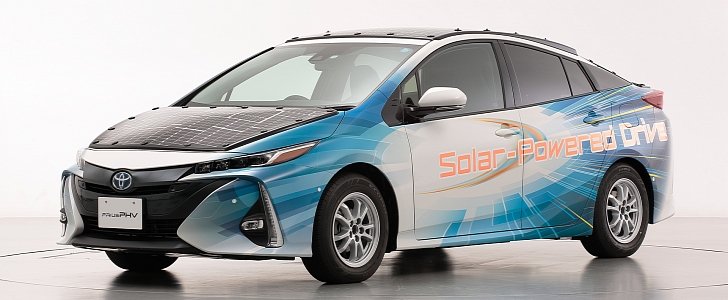As of late July this year and through to March 2020, Toyota is running trial tests on public roads with a prototype of solar-powered car that could very well revolutionize the auto industry.
The project is a partnership with solar panels maker Sharp Corp. and New Energy and Industrial Technology Development Organization of Japan, or NEDO, and features a modified Toyota Prius PHV. The goal is to take it on the road strapped with solar panels and see if they can make it run for ever without the need to plug it in.
The Prius plug-in hybrid already comes with the option of solar panels but they only charge the battery when the car is parked, and the equivalent in converted energy is about 4 miles. The prototype, on the other hand, is able to charge both when parked and when driving, has an efficiency of conversion of solar energy of 34 %, and will run on that energy for almost 27 miles, Toyota said back in July, when the project was launched.
The solar panels developed by Sharp are only 0.03 mm thick, which makes them flexible. This, in turn, means they can be fitted over almost the entire surface of the car and not just on the roof, as is the case with the current mass-produced Prius PHV.
The prototype, as shown in the images in the gallery, will have solar panels fitted to the roof, hood, rear hatch door and rear hatch door garnish, with the goal of fueling from the sun and eliminating the need to plug in for a recharge.
Mitsuhiro Yamazaki, director at the solar energy systems division of NEDO, tells Bloomberg that, if the prototype is driven 4 days a week for a maximum of 31 miles, it no longer requires to be plugged into an outlet. Even so, Toyota acknowledges that a future when cars won’t have to plug in and will be able to rely solely on solar energy is far away. But they’re willing to strive to bring that future closer.
The Prius plug-in hybrid already comes with the option of solar panels but they only charge the battery when the car is parked, and the equivalent in converted energy is about 4 miles. The prototype, on the other hand, is able to charge both when parked and when driving, has an efficiency of conversion of solar energy of 34 %, and will run on that energy for almost 27 miles, Toyota said back in July, when the project was launched.
The solar panels developed by Sharp are only 0.03 mm thick, which makes them flexible. This, in turn, means they can be fitted over almost the entire surface of the car and not just on the roof, as is the case with the current mass-produced Prius PHV.
The prototype, as shown in the images in the gallery, will have solar panels fitted to the roof, hood, rear hatch door and rear hatch door garnish, with the goal of fueling from the sun and eliminating the need to plug in for a recharge.
Mitsuhiro Yamazaki, director at the solar energy systems division of NEDO, tells Bloomberg that, if the prototype is driven 4 days a week for a maximum of 31 miles, it no longer requires to be plugged into an outlet. Even so, Toyota acknowledges that a future when cars won’t have to plug in and will be able to rely solely on solar energy is far away. But they’re willing to strive to bring that future closer.









